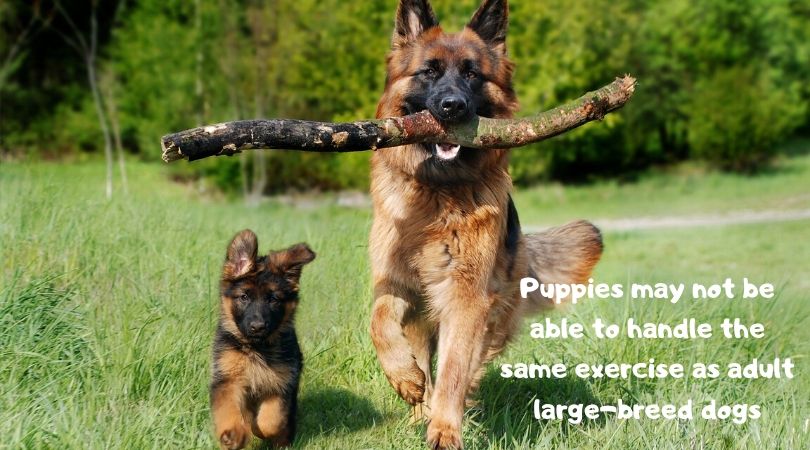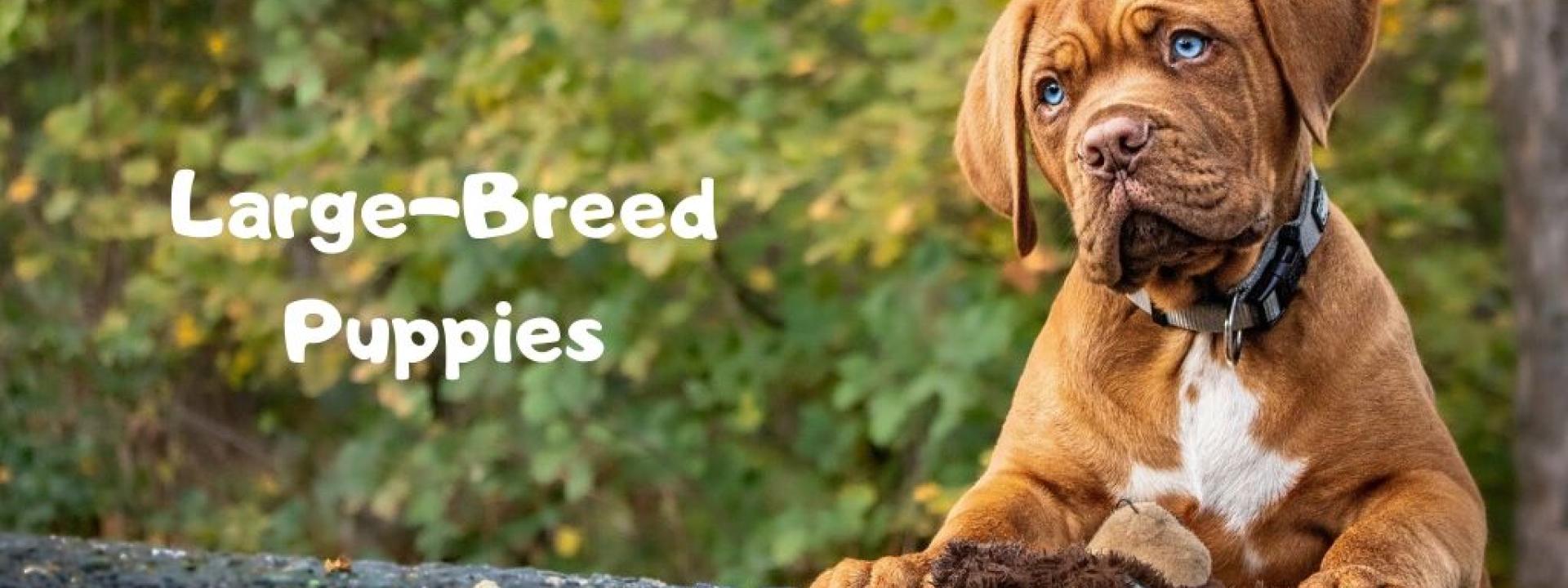Is your fur baby destined to turn into a fur giant? If you own a large-breed puppy, they may be a lap dog now, but before you know it, they’ll be way too big for cuddles on the couch. Of course, your colossal canine will still be just as lovable, but you’ll need to know a few things about taking care of a large-breed puppy.
Which Dogs are Considered Large Breed?
In order to easily tell the difference between breed sizes, dog breeders actually have a whole dog sizing system. Per this measurement method, a dog has to weigh at least 50 pounds (sometimes 70 pounds) and have a height of around 24 inches to be considered a large-breed dog.
Some popular large-dog breeds include:
- Afghan Hound
- Bloodhound
- Boxer
- Bullmastiff

- Chow Chow
- Collie
- Dalmatian
- German Shepherd
- Golden Retriever
- Greyhound
- Irish Setter
- Labrador Retriever
- Old English Sheepdog
- Pointer
- Poodle
- Rhodesian Ridgeback
- Rottweiler
- Siberian Husky
- Weimaraner
(If you don’t see your dog’s breed here – they may be categorized as a smaller “medium” breed dog or a larger “giant” breed dog.)
Finding a Good Vet for Your Large-Breed Puppy
The first place you should always go with a new pet is the vet’s office for a checkup. If you don’t already have a vet or know of a vet, check around with friends or search the web to find out if there are any local vets that specialize in large-breed dog care. You can even reach out to local veterinary offices to ask questions and get to know their staff and services.
Your initial visit with the vet should be the first of many visits to ensure the best preventative health care for your big buddy. Make sure to ask the vet which puppy foods he/she recommends, how often to feed your puppy, what size meal portions should be, etc. You might think that puppies need to gain weight as quickly as possible to reach their full growth potential, but with large-breed puppies, just the opposite is true. Your vet will want to monitor your puppy’s growth and weight gain; a slow, uniform rate of growth can help your grown dog have healthier joints and hopefully avoid hip dysplasia.
Most puppies should receive intervals of vaccinations starting at six to eight weeks of age through to 16 weeks of age. However, you will need to set up a vaccination plan with your vet for your particular pup. Now is the time to also discuss safe options for controlling parasites (both internal and external) as well as the right time to spay or neuter your large-breed puppy. If your large-breed puppy is also a deep-chested breed, you may want to talk to your veterinarian about having the dog's stomach “tacked” at the same time as the spay/neuter surgery. Also known as gastropexy, this procedure is used to help keep the stomach from twisting and causing gastric torsion or bloat.
Feeding Your Large-Breed Puppy

Large-breed puppies are more sensitive to an excess or shortage of calcium while their bones are growing, which can be a problem if they’re eating a puppy food made for all sizes of puppies. According to the pet food guidelines of the Association of American Feed Control Officials (AAFCO), pet foods that are categorized for “growth” are required to specify if they have met additional guidelines just for large- and giant-breed puppies (basically a reduced range of calcium).
If you have a dog that you think will be close to or above 70 pounds as an adult, look for a puppy food with the following nutritional adequacy statement:
[Pet Food Name] is formulated to meet the nutritional levels established by the AAFCO Dog Food Nutrient Profiles for growth/all life stages INCLUDING growth of large-size dogs (70 lbs or more as an adult).
Puppy food is high in minerals, protein, and calories, which could cause your (now) little guy or gal to grow unnaturally fast, so a big part of taking care of a large-breed puppy is ensuring that they stay at a healthy weight. Once you have found the right food, it’s important that you know how often to feed your large-breed puppy. For example, your veterinarian may recommend that puppies eight to 12 weeks old be fed four (small) meals a day, puppies three to six months old be fed three meals a day, and puppies six months to one year generally be fed two meals a day. Once your dog turns a year old, one meal a day is usually enough; however, sometimes it’s better to feed larger dogs two smaller meals a day. Again, your veterinarian will help you determine the best feeding schedule for your dog.
Don’t leave food in your puppy’s bowl all day, because this is a sure way for them to overeat, and avoid feeding him table scraps and/or human snacks. As your puppy grows larger and larger, beware of leaving food out, as large-breed dogs can definitely help themselves to food left at table- or counter-height.
Exercising Your Large-Breed Puppy
Although your large-breed puppy might look big enough to go jogging with you (and have enough energy for it, too), she won’t actually reach skeletal maturity until she’s between 18 months and 2 years old. For that reason, you need to make sure your puppy isn’t going overboard and doing high-impact activities. Jumping and running on hard surfaces are a sure way to cause orthopedic problems. It’s important not to let large-breed pups jump on and off the furniture, pound their joints by running on hard surfaces, or even go up and down the stairs too often on their own. If you don’t want to carry your puppy up and down stairs (or physically can’t), that means using a ramp or limiting where they can go in the house.

Training Your Large-Breed Puppy
Unlike smaller dogs, even basic things like walking, feeding, or giving your large-breed dog a bath will be highly difficult if they don’’t cooperate – and let’s not even talk about a rowdy large-breed dog that likes to jump up on people! This is why proper training is so important – and the sooner you can start training, the better. Remember, if you don’t put in the effort now, you’ll only be making things more and more difficult in the future.
If you don’t feel capable of training your dog or you would just like some extra support during the process, find a professional dog trainer that can help out. A professional trainer will work with you on obedience training and handling a large-breed dog, as well as help with any behavior issues that your puppy has demonstrated.
Loving Your Large-Breed Puppy
They may seem enormous and slightly overwhelming at times, but large-breed dogs are also loving and extremely loyal. A dog is a best friend for life, and bigger dogs just need a little more guidance and care. Your large-breed puppy is just a handful now, but before you know it – they’ll be an armful, and then even bigger! Make sure you learn as much as you can about taking care of a large-breed puppy early on to ensure you both have an easier, healthier life down the line!

